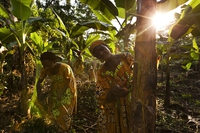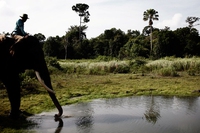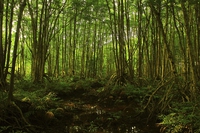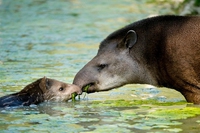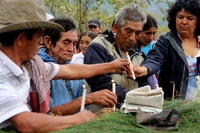
Environmental activists are in danger more than ever
In 2014, the number of environmental activists murdered has increased. Brazil is the most dangerous country for environmental defenders.
In 2014, the number of environmental activists murdered has increased. Brazil is the most dangerous country for environmental defenders.
In the Nepalese part of the Terai Arc, a narrow subtropical corridor connecting India and Nepal, women head a project of forest conservation and social development. Since 2001, they have been safeguarding biodiversity in an area of incalculable natural value, guaranteeing the “ecological, economic and socio-cultural integrity of the region”. The Terai Arc Landscape (TAL)
Secondo un nuovo studio senza la dispersione dei semi effettuata da questi animali le foreste non sopravvivrebbero.
Between 2009 and 2012 Brazil and Indonesia were given 346 million dollars by the U.N. – mostly from Norway and Germany – to preserve rainforests. But this good piece of news is completely omitted in the report written by the Overseas Development Institute (ODI), according to which in the same period those countries have spent
In order to curb CO2 emissions and global warming, the vegetation on the Earth is doing its best. Over the last decade, trees and plants all over the world have stored 4 billion tonnes more of greenhouse gases, thanks to reforestation projects in China, to an increase of forests in some countries of the former
Palm oil is an edible oil plant that is a common ingredient in many consumer products, and it has become the most widely produced vegetable oil worldwide. Palm oil global consumption increased sharply: in 2014 it amounted to 56.63 million metric tonnes, and it is expected to exceed 60 million in 2015, according to studies by The
The European countries foster illegal deforestation around the world, despite they are among those who violate international laws and conventions the less. In order to meet the demand of agricultural products in Europe, between 2000 and 2012, the equivalent of a soccer field was illegally deforested every 2 minutes, violating national laws of those countries
A new study carried out by UNEP highlighted the ongoing destruction of mangrove forests, whose disappearance implies a yearly cost of 42 billion dollars.
Il presidente colombiano ha annunciato l’intenzione di creare la più grande area protetta del mondo che si estenderà dall’Oceano Atlantico alle Ande.
Tapir is a funny animal, similar to a crossbreed between a wild boar and an ant eater, with the squat body of the former and the long nose of the latter. In Brazil, idiots are named “tapirs”. Yet, these large herbivores are extraordinary animals with a highly biological importance. Here are 10 facts that will make



